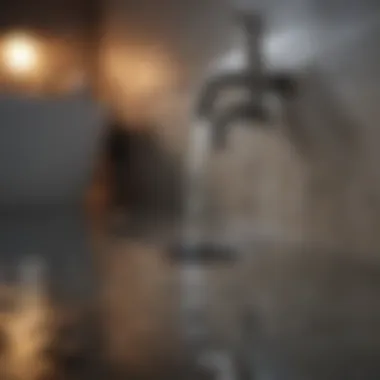Natural Solutions for Clogged Sink Drains


Intro
In modern households, clogged sink drains represent a common frustration. The inconvenience often arises from grease, food particles, or debris accumulating within pipes. Many default to using chemical drain cleaners, which pose environmental and health risks. Instead, exploring home remedies offers practical solutions that are both efficient and safe for your plumbing systems.
This article delves into effective home remedies for addressing clogged sink drains using everyday household ingredients. It highlights various methods, emphasizing sustainability, economic advantages, and the underlying science behind these solutions. With proper understanding, homeowners can implement preventative measures and steps to restore drainage without resorting to commercial chemicals.
A deeper comprehension of these remedies not only resolves immediate issues but also contributes to long-term maintenance of plumbing systems. In the following sections, you will find significant details on trending remedies and scientific analyses that can empower your approach to a better functioning home.
Understanding Drain Clogs
Understanding the nature of drain clogs is crucial when approaching home remedies for sink drainage issues. Many homeowners encounter clogged sinks at some point, leading to frustration, inconvenience, and potential damage. Recognizing how clogs form helps in choosing effective remedies and establishing good habits for avoiding such issues in the future.
Every drain functions to remove waste products efficiently. However, various substances can accumulate and create obstacles. This knowledge allows for targeted solutions, minimizing reliance on harsh chemical cleaners that might damage plumbing over time. Moreover, armed with an understanding of clogs, one can immediately assess the significance of the problem and decide when to apply a remedy or consult a professional.
Causes of Clogged Drains
Clogged drains can be attributed to several factors, each contributing uniquely to the blockage.
Food Residue and Grease
Food scraps and grease are prominent causes of drain clogs. Cooking oils can solidify in pipes, especially when mixed with food particles. This creates a thick build-up that traps additional debris. Moreover, the blend of different food residues leads to stubborn clogs.
The key characteristic of this type of blockage is its gradual formation. Over time, grease can harden, causing severe obstructions that are challenging to remove. Recognizing this cause emphasizes proper disposal of fats and food scraps. Adopting these practices can substantially reduce kitchen clogs.
Hair Buildup
Hair contributes significantly to clogs, particularly in bathrooms. When washed down the sink, stray hairs can tangle with soap scum and other residues, forming dense masses that restrict water flow.
The major aspect of hair build-up is its insidious nature. It often accumulates over time without immediate indications. Regular cleaning can mitigate this issue, but its presence highlights the importance of preventative measures such as drain screens or traps. Proper management can prevent extensive clogging and the need for harsh cleaning agents.
Soap Scum Accumulation
Soap scum results from soap reacting with minerals in water. This can create a filmy layer along pipes, reducing water flow. Over time, soap scum can combine with other residues, leading to more serious clogs.
Its distinct feature is how it forms in nearly all households. Offering simple home remedies against soap buildup can protect against serious clogs. Utilizing natural cleaning agents can gradually eliminate these residues, creating a healthier drain environment.
Foreign Objects and Debris
Sometimes, clogs arise from foreign objects mistakenly sent down drains. Items like hairpins, food packaging, or small toys can block pipes unexpectedly.
The defining characteristic of this blockage type is unpredictability. Unlike gradual buildups, foreign objects can cause instant blockage. Awareness is key; not allowing anything except water, soap, and waste into drains can prevent these unnecessary complications.
Signs of a Clogged Drain
Identifying signs of a clogged drain can enable timely interventions, minimizing frustration.
Slow Water Drainage
One of the first indicators is slow water drainage. This occurs when the water flows less efficiently due to a blockage. This situation may seem minor at first but can escalate into complete obstruction.
The notable feature here is usually gradual. Homeowners should consider this warning sign and take action swiftly. Proactive measures can prevent further build-up from forming.
Unpleasant Odors
Unpleasant odors can be a strong indicator of a clogged drain. Food debris or stagnating water can emit foul smells as they decay within pipes.
These odors signal that food waste is trapped. Immediate cleaning may alleviate this scent. Recognizing foul smells as a problem is essential for prioritizing drain maintenance, leading to longer-lasting plumbing systems.
Water Backflow
Water backflow can signal severe clogging. Instead of flowing down the drain, water may rise back into the sinks. This situation can be messy and indicates a significant blockage in the plumbing system.


The most concerning aspect here is its potential to damage physical property and promote mold growth. For this reason, understanding the implications of backflow is fundamental. Homeowners facing this issue should act promptly and assess whether expert advice is needed.
The Importance of Regular Maintenance
Regular maintenance is key to ensuring your sink drains operate effectively over time. By incorporating consistent care methods, you can prevent significant clogs and avoid costly plumbing repairs. This section focuses on preventative strategies which can help maintain the health of your drainage systems.
Preventative Strategies
Routine Cleaning Practices
Routine cleaning practices are essential in keeping drains clear. This involves scheduling regular cleanings at intervals that suit your household needs. These practices may include rinsing with hot water or using natural cleaning agents such as vinegar periodically.
The key characteristic of routine cleaning practices is the simplicity and accessibility of the methods involved. For homeowners, this makes it a beneficial choice. Often, these practices can be completed quickly and with minimal effort, often using items already present in your home. However, over time, neglect can result in more complex blockages that may require professional intervention.
Use of Drain Screens
The installation of drain screens serves as a preventive barrier against clogs. These screens can trap hair, food particles, and other debris before they enter the plumbing system. This is particularly important in kitchens and bathrooms, where such materials are commonly washed away.
The unique feature of drain screens is their capacity to provide a cost-effective solution to drainage problems. They are easy to install and require very little maintenance themselves, making them a popular choice for many households. One disadvantage is that they require occasional cleaning to ensure they remain effective; otherwise, they may lead to water backup.
Awareness of what to Avoid
Having an awareness of what to avoid is a critical aspect of drain maintenance. Homeowners should understand which substances can lead to clogs, such as grease, coffee grounds, and fibrous materials. Recognizing and avoiding these can significantly help in maintaining clear drains.
This knowledge can be very valuable, as it empowers homeowners with information to make informed choices in their daily activities. By not putting harmful substances down the sink, individuals can lessen the risk of severe drainage issues. However, some may find this guidance less straightforward when it comes to accidental disposal of foreign objects in the sink.
Benefits of Natural Remedies
Natural remedies offer numerous advantages when compared to chemical solutions. Understanding these benefits helps highlight the importance of adopting these practices in regular maintenance.
Cost-Effectiveness
Natural remedies often use common household ingredients like baking soda, vinegar, or salt, making them highly cost-effective. This aspect contributes significantly to the appeal of these options. It not only saves money but also reduces waste as homeowners can use what they already have.
Unique features of cost-effectiveness lie in the fact that these remedies typically require little more than what is already on hand. While they might not work as quickly as commercial products, their overall value is evident in their affordability and simplicity.
Environmental Considerations
Another critical factor is the environmental considerations associated with natural remedies. Many standard drain cleaners contain harsh chemicals that can damage the environment. Opting for natural alternatives helps protect waterways and earth, making it a conscientious choice.
The unique advantage of this approach is rooted in the safety and sustainability it offers. Many people feel good knowing that they are not introducing hazardous substances into their home or environment. However, it is worth noting that effectiveness can vary depending on the nature of the clog.
Safety for Household Members
Safety is always a primary concern, especially in households with children or pets. Natural remedies provide a safer alternative compared to chemical cleaners, which can pose ingestion or respiratory risks. By using safe ingredients, the likelihood of accidents is considerably reduced.
This is a significant advantage, particularly for families with young children or sensitive individuals. Natural solutions tend to have minimal health risks associated with their use. However, one must remain vigilant regarding the proper storage of remedies, even if they are non-toxic.
In summary, regular maintenance is vital for prolonging the life of your plumbing system. By adopting simple preventative strategies and recognizing the benefits of natural remedies, you can effectively manage your sink's health.
Common Home Remedies
Home remedies play a crucial role in managing clogged sink drains. They provide practical alternatives to store-bought chemicals that can be harmful to both health and environment. Utilizing easily accessible ingredients, these remedies minimize costs while addressing drainage issues effectively. Moreover, they promote sustainable practices, reducing waste and excess chemicals. Overall, they serve as a starting point for both prevention and quick fixes in household plumbing.
Baking Soda and Vinegar
Mechanism of Action
The combination of baking soda and vinegar produces a chemical reaction that releases carbon dioxide gas. This gas can create foam, helping to dislodge debris in the drain. Its attraction lies in its ability to break down grease and food particles without harsh chemicals. This method is often a preferred choice due to its simplicity and effectiveness. It is also non-toxic, making it suitable for households with children and pets.
Step-by-Step Instructions


To implement this remedy, start by pouring half a cup of baking soda directly into the drain. Follow this with half a cup of vinegar. The expected bubbling reaction will occur. After approximately 15 to 30 minutes, flush the drain with hot water. This process is popular for its effectiveness and minimal fuss. It is a straightforward solution that does not require special tools or extensive preparation.
Expected Results
After using baking soda and vinegar, many users notice improved flow in their drains. The unique feature of this method is its performance in removing light to moderate clogs. However, it might not work for severe blockages or radically damaged pipes. Users appreciate its efficiency and the lack of chemical residue left in the environment, making it a staple in home remedies for drains.
Salt and Hot Water
How It Works
Salt acts as an abrasive, aiding in the dislodgment of accumulated debris. When combined with hot water, it enhances the solution's flow and ability to dissolve grease or food particles. The method is recognized for its basic nature and easy execution. It is noted for being a safe choice, both for plumbing fixtures and the environment.
Application Process
To apply this mixture, start by boiling water. Once boiling, mix in a cup of salt until dissolved. Pour the saline solution directly into the drain to allow it to work on the clog. This process is uncomplicated, requiring merely common household items. It avoids any potential mess during application, which is an important consideration when dealing with plumbing.
Effectiveness Assessment
Most users find that this remedy effectively clears simple clogs, especially in kitchen sinks. The challenge arises with tougher blockages, where this method may fall short. Despite this drawback, it remains a practical option for regular maintenance, minimizing the likelihood of buildup.
Dish Soap and Hot Water
Rationale for Use
Dish soap helps to break down grease quickly and effectively. The rationale behind using it with hot water is the heat enhances the soap's ability to dissolve buildup, making it more efficient. This remedy is praised for its low cost and easy access, making it a frequent go-to in many households.
Guide to Implementation
To use this remedy, start by boiling a pot ofwater. While it heats, squirt a generous amount of dish soap down the drain. Then, carefully pour the hot water into the drain. The combined action of soap and heat is seen as a powerful means to tackle grease build-up. This guide is effective for a variety of sink types, but care should be taken with specific plumbing materials.
Considerations for Various Drains
Not all drains respond the same to dish soap and hot water. While it works well in kitchen sinks, one must be cautious with bathroom drains that may have hair or soap scum build-up. It's critical to remain aware of the specific type of blockage for best results.
Borax as a Drain Cleaner
Scientific Background
Borax, or sodium borate, is a naturally occurring mineral. Its cleaning properties derive from its alkali content, which makes it effective in breaking down grease or organic matter in drains. Its use is becoming more popular due to its lower environmental impact than traditional chemical drain cleaners.
Procedure to Follow
To utilize borax, begin by pouring directly into the drain. Follow this with boiling water to activate its cleaning properties. Allow it to sit for at least 30 minutes, then flush with hot water. This method stands out for its straightforwardness while providing potential for substantial cleaning power. It can also assist in eliminating odors commonly associated with clogs.
Safety Precautions
When using borax, it’s important to take basic precautions. Avoid inhaling the powder and keep it away from children and pets. While borax is safer than many commercial products, it still requires careful handling. Users appreciate the effectiveness alongside manageable safety risks.
Using a Plunger
Types of Plungers
Different types of plungers exist for various drain scenarios. The cup plunger is most common, suitable for sinks and tubs, while a flange plunger is specialized for toilets. Choosing the right plunger ensures better success in unclogging sinks. This knowledge is important for efficient plumbing maintenance.
Technique Overview
To use a plunger effectively, ensure there’s enough water to cover the cup. Make a tight seal against the drain and push down with force before pulling up sharply. This repeated action creates pressure that can dislodge clogs. Proper technique is essential for maximal effectiveness, ensuring that effort translates into results.
Situations Requiring This Approach
Plungers are particularly helpful for solid clogs, such as those caused by food or hair. They may not be effective for completely blocked drains. However, this method provides a non-invasive means to tackle sink issues before considering more dire measures. Assessing the situation correctly helps in making the right choice.


When to Call a Professional
In the realm of home maintenance, knowing when to seek professional assistance can be critical. Not all clogged drains can be resolved with home remedies. This section discusses the scenarios that warrant a professional plumber's intervention, helping homeowners make informed choices about their plumbing challenges.
Persistent Clogs
Indicators of Serious Issues
Persistent clogs often signal more than just a simple blockage. When a drain remains clogged despite repeated home remedy attempts, it may indicate underlying problems such as broken pipes or tree root intrusion. Recognizing these indicators is crucial. Common signs include gurgling sounds coming from drains and multiple drains backing up simultaneously. Identifying these issues early can potentially save time and money down the road.
The key characteristic of persistent clogs is their tendency to worsen over time. Home remedies may provide temporary relief, but they often fail to address the root cause. This aspect makes it a prominent focus in this article. Failure to rectify serious plumbing issues can lead to irreversible damage.
It is beneficial for homeowners to understand that while DIY methods can be appealing, they may not always be effective in addressing complex drainage issues. Knowing when to act is essential.
Potential Risks of Delay
Ignoring persistent plumbing issues can result in significant setbacks. The longer a clog remains, the greater the risk for damages, such as flooding, which can lead to costly repairs. Beyond structural risks, untreated clogs can cause unsanitary conditions in the home. This situation emphasizes the importance of timely intervention.
The key characteristic of these risks is that they often compound over time. Initial minor issues can escalate into serious plumbing nightmares. This aspect serves as a cautionary point in this article, highlighting the urgency of seeking expertise.
Homeowners should remain aware of how their decisions can influence the situation. Unaddressed problems can lead to a cycle of recurring issues and ultimately, the need for an expensive repair.
Complex Plumbing Systems
Complexities of Modern Homes
Modern homes often come with intricate plumbing systems that can be challenging to navigate. With advanced features like multiple units and complicated drainage pathways, homeowners may find themselves overwhelmed. This complexity adds to the importance of recognizing when to seek professional help.
The key characteristic of such systems is their interconnectedness. A problem in one area can easily affect another, making it crucial for homeowners to understand the scope of potential plumbing issues. This interconnected nature makes consulting a professional a wise choice, especially for more complex concerns.
It is significant for homeowners to know that DIY solutions may be insufficient for resolving issues in complex plumbing arrangements.
Understanding Limits of DIY Remedies
While home remedies can effectively address moderate drain clogs, they have their limits. Understanding these limitations is crucial for effective home maintenance. DIY methods might not reach deeper blockages or complex plumbing structures.
The key characteristic of this understanding is knowing when your ability to resolve a problem ends. Recognizing the boundaries of personal skills can prevent escalating problems. This focus ensures that homeowners are aware of the need for professional insight when situations become unmanageable.
Many DIY remedies come with their risks. Using harsh chemicals can lead to reactions that may damage pipes or worsen the clog. Balancing knowledge of home remedies with an understanding of when a professional is necessary is vital for effective and safe plumbing management.
"Sometimes going DIY can lead to bigger problems. Knowing when to step back can save time and money."
Culmination
The conclusion of this article encapsulates a fundamental understanding of maintaining clear sink drains using home remedies. It highlights how proactive measures can prevent common plumbing issues. By utilizing household ingredients, individuals can effectively clear minor clogs and maintain their plumbing systems. This approach is not only cost-effective but also aligns with environmentally friendly practices.
Summary of Effective Practices
In this article, we outlined several home remedies that can clear sink drains. Each remedy has distinct properties and processes that can mitigate the issue of clogs:
- Baking Soda and Vinegar: These two ingredients create a chemical reaction that can help dislodge debris.
- Salt and Hot Water: Salt can aid in breaking down grease, while hot water flushes the system.
- Dish Soap and Hot Water: This combination is effective for loosening grease accumulation.
- Borax: This compound serves as a cleaner and can degrade stubborn blockages.
- Plungers: A manual approach for more persistent clogs.
These practices help ensure a functional drainage system and alleviate the need for more aggressive chemical solutions.
Final Considerations
Maintaining Drain Health
Maintaining drain health is an essential aspect of plumbing management. Routine cleaning practices, such as applying a mixture of baking soda and vinegar monthly, can prevent buildup and extend the life of your plumbing. The key characteristic of maintaining drain health is consistency; regular upkeep can yield lasting benefits in avoiding severe clogs. One unique feature is that these methods use non-toxic ingredients, making them safe for households with children or pets. The advantage of preventative maintenance is significant, as it minimizes emergency interventions which can be costly and disruptive.
Evaluating Home Remedies Effectiveness
Evaluating the effectiveness of home remedies is crucial for understanding their impact long-term. Testing these remedies on different clogs will provide insight into what works best in various situations. A key characteristic of this evaluation is adaptability; knowing when to switch techniques enhances efficiency. The unique feature of this evaluation process is that it empowers homeowners to take charge of their plumbing. However, the disadvantage may be occasional trial and error, as some methods may not work for all scenarios. Ultimately, assessing home remedies leads to informed decisions, making it a beneficial practice for sustainable plumbing care.
"Effective home remedies simplify maintenance and promote a healthier living environment. They are an essential part of any homeowner's toolkit."
By following the practices discussed, readers can achieve a greater awareness of the capabilities and limits of home remedies, ensuring their sink drains function efficiently.















